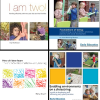Government urged to consider new funding options for early childhood education and care
A coalition of Early Years organisations convened by Kindred2 , including Early Education and providers such as LEYF and Ark Start, has identified a series
Organisations representing Maintained Nursery Schools have joined together to warn the government that it must provide a long-term funding solution for Maintained Nursery Schools (MNS) as part of this autumn’s spending review if further closures and cuts to staffing and services are to be avoided.
Early Education, NAHT NEU and Unison have written to both the Chancellor and the new Secretary of State for Education outlining the perilous position Maintained Nursery Schools now find themselves in as a result of ongoing funding uncertainty. Their joint submission for this autumn’s Comprehensive Spending Review details the level of investment required from government to put this crucial part of the sector back on a stable and sustainable financial footing.
The submission highlights how current funding arrangements were only ever meant to be a ‘temporary fix’ and are subject to wide variability across the country. This approach has led to further nursery school closures in recent years, with only 385 now left across the whole of England.
In a letter to the new Secretary of State for Education, Nadhim Zahawi, the organisations call for a sufficient, predictable and long-term settlement in order to allow MNS to continue their work in delivering better outcomes for disadvantaged children, support for children with SEND and system leadership for the early years.
The submission outlines six steps the government should take as part of a long-term funding solution for Maintained Nursery Schools:
This submission comes ahead of a planned march on Downing Street on 19 October, where school leaders, staff and parents will call on the Chancellor directly to address the issue of Maintained Nursery School funding as part of the upcoming spending review.
Paul Whiteman, general secretary of school leaders’ union NAHT said: “Quite frankly, this situation has gone on for far too long. It is simply not acceptable for Maintained Nursery Schools to go from one term to the next not knowing what their funding situation will be. The current funding arrangements were only ever designed to be a sticking plaster, whilst a long-term solution was found. We cannot wait any longer for that solution to be provided. We urge government to use this autumn’s comprehensive spending review as an opportunity to provide this crucial part of the Early Years sector with the sufficient and sustainable funding it so desperately needs.”
Beatrice Merrick, chief executive of Early Education said: “Maintained nursery schools have a vital role to play in supporting post-pandemic recovery, but they can only do this if they have financial security going forward. They play a vital role in supporting 40,000 children in some of the most deprived areas of the country, and have an outstanding record in levelling up disadvantaged children’s outcomes to match those of their more advantaged peers. They also provide support for children with complex needs who would otherwise struggle to find appropriate early education places. This is a sector which time and again goes the extra mile to deliver key government policies for young children. Is it too much to ask that they should have the same financial security as other schools to enable to them to continue their vital work?”
UNISON assistant general secretary Jon Richards said: “It’s more than four years since ministers promised a long-term funding solution for maintained nursery schools, and they’re still to deliver. With that uncertainty, nursery schools cannot even budget properly. The government must stick to its pledge without delay. This vital service for young children and their communities needs the security of a sustainable settlement.”
Kevin Courtney , joint general secretary, National Education Union said: “Maintained nursery schools have proven time and time again that they are centres of excellence, as all are graded as outstanding or good by Ofsted. They are often located in the most deprived areas of the country and provide skills and resources which support children with SEND. It is deeply damaging to these schools that year after year they have to live hand to mouth uncertain of their financial future. In the last 12 months, four more maintained nursery schools have been forced to close due to insufficient funding. Only 385 maintained nursery schools remain. Supplementary funding for maintained nursery schools was a stop-gap measure. It is completely unacceptable for the government to take over five years to provide a long-term funding solution. The risk to further closures is too great and these schools need action now. The NEU is calling on the government to use this autumn’s comprehensive spending review to provide a viable long-term funding solution for maintained nursery schools from September 2022.”
Notes to editors:
The 385 maintained nursery schools (MNS) in England are local authority-run schools for two, three and four-year-olds. They are a unique resource, offering outstanding education and care to 40,000 children, including some of the country’s most vulnerable and disadvantaged children.
Early Education (The British Association for Early Childhood Education) is the leading independent national charity for early years practitioners and parents, campaigning for the right of all children to education of the highest quality. Founded in 1923, it has members in England, Northern Ireland, Scotland and Wales and provides a national voice on matters that relate to effective early childhood education and care of young children from birth to eight. The organisation supports the professional development of practitioners through publications, training, conferences, seminars and access to a national and regional branch network. For more information on the work of Early Education visit www.early-education.org.uk

A coalition of Early Years organisations convened by Kindred2 , including Early Education and providers such as LEYF and Ark Start, has identified a series
We urge members to respond to the two DfE consultations on funding and ratios which close on 16 September. For information, you can view the
We welcome today’s announcement from government that it intends to allocate a further £10m to raise the level of supplementary funding for those maintained nursery
The Times Education Commission has today published a report which calls for “A significant boost to early years funding targeted at the most vulnerable and
Government has today published its Schools White Paper “Opportunity for all”. We welcome the fact that early years gets a few mentions: However, the “key
DfE has just published new figures on the number of new entrants to Early Years Initial Teacher Training (EYITT). This is the route that leads to
In response to the growing concerns of its membership related to children and their families living in poverty we asked members, in May last year,






Early Education
2 Victoria Square
St Albans
AL1 3TF
T: 01727 884925
E: office@early-education.org.uk